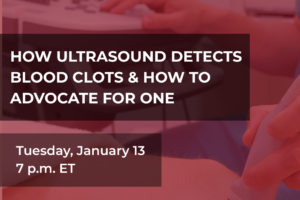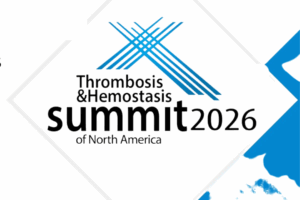MASAB Memo #6, April 16, 2018
The HOKUSAI VTE Cancer Study
by Michael Streiff, MD, Professor of Medicine and Pathology, Johns Hopkins School of Medicine, Baltimore
 Cancer increases the risk of blood clots by 4-7 fold on average.1,2 Consequently, cancer is identified as a contributing risk factor in up to 20% of patients who suffer a blood clot.3 Based upon a number of randomized controlled trials, most notable the CLOT and CATCH trials4,5, low molecular weight heparin (LMWH) has long been recommended as the first line treatment for cancer associated blood clots.
Cancer increases the risk of blood clots by 4-7 fold on average.1,2 Consequently, cancer is identified as a contributing risk factor in up to 20% of patients who suffer a blood clot.3 Based upon a number of randomized controlled trials, most notable the CLOT and CATCH trials4,5, low molecular weight heparin (LMWH) has long been recommended as the first line treatment for cancer associated blood clots.
The trouble with LMWH is that it is given by injection which is uncomfortable making perfect adherence difficult. In fact, data from real world studies indicate that a substantial number of patients switch to a pill within a month or two of starting LMWH shots.6, 7 The status quo changed this past December 2017, at the American Society of Hematology meeting. Gary Raskob, PhD, and colleagues presented the results of the HOKUSAI VTE Cancer study, a large randomized controlled trial which compared dalteparin, a low molecular weight heparin, with edoxaban, an oral factor Xa inhibitor in nearly 1100 patients with cancer and vein blood clots.8 They found that edoxaban was just as good as dalteparin shots. Edoxaban was associated with a trend toward fewer new blood clots than dalteparin (7.9% versus 11.3%) but more bleeding events (6.9% versus 4.0%). The severity of bleeding events was similar between the two treatments. When the researchers carefully examined which patients tended to have more bleeding with edoxaban, patients with intestinal cancer were at greater risk. There was no difference in survival.8
What do these results mean for cancer patients with vein blood clots? For the first time we have high-quality evidence that a pill is just as good as an injection for treatment of cancer associated vein blood clots. Therefore, cancer patients no longer need to endure months of injections to treat a leg vein (DVT) or lung blood clot (PE). Instead they can take a pill. To make sure that patients get the best results there are several important considerations to take into account. Patients with cancers in the stomach and intestines had more bleeding with edoxaban than LMWH. Therefore, edoxaban may not be as safe in these patients. In addition, patients with poor kidney and/or liver function or taking certain medications that affect edoxaban levels were not allowed to participate in the study. Consequently, patients should make sure that their doctor checks to make sure they fulfill these requirements for edoxaban use. In addition, all study patients were first treated with a LMWH for at least 5 days before starting edoxaban so patients should make sure their treatment adheres to this protocol. Since edoxaban wears off quickly, it is important not to miss any doses during treatment. Finally, liver and kidney tests and blood counts should be done on a regular basis during edoxaban treatment to make sure it is still safe to take.
Although this advice for edoxaban therapy may make it seem as if treatment with edoxaban is very complex, most of these practices are standard for all medications. The bottom line is much simpler. For the first time we can say for cancer associated clotting, “we’ve got a pill for that.”
References
- Heit JA, O’Fallon WM, Petterson TM, et al. Relative impact of risk factors for deep vein thrombosis and pulmonary embolism: a population-based study. Arch Intern Med 2002;162:1245-8.
- Blom JW, Doggen CJ, Osanto S, Rosendaal FR. Malignancies, prothrombotic mutations, and the risk of venous thrombosis. JAMA 2005;293:715-22.
- Timp JF, Braekkan SK, Versteeg HH, Cannegieter SC. Epidemiology of cancer-associated venous thrombosis. Blood 2013;122:1712-23.
- Lee AY, Levine MN, Baker RI, et al. Low-molecular-weight heparin versus a coumarin for the prevention of recurrent venous thromboembolism in patients with cancer. N Engl J Med 2003;349:146-53.
- Lee AY, Kamphuisen PW, Meyer G, et al. Tinzaparin vs Warfarin for Treatment of Acute Venous Thromboembolism in Patients With Active Cancer: A Randomized Clinical Trial. JAMA 2015;314:677-86.
- Khorana AA, Yannicelli D, McCrae KR, et al. Evaluation of US prescription patterns: Are treatment guidelines for cancer-associated venous thromboembolism being followed? Thromb Res 2016;145:51-3.
- van der Wall SJ, Klok FA, den Exter PL, et al. Continuation of low-molecular-weight heparin treatment for cancer-related venous thromboembolism: a prospective cohort study in daily clinical practice. J Thromb Haemost 2017;15:74-9.
- Raskob GE, van Es N, Verhamme P, et al. Edoxaban for the Treatment of Cancer-Associated Venous Thromboembolism. N Engl J Med 2017.







